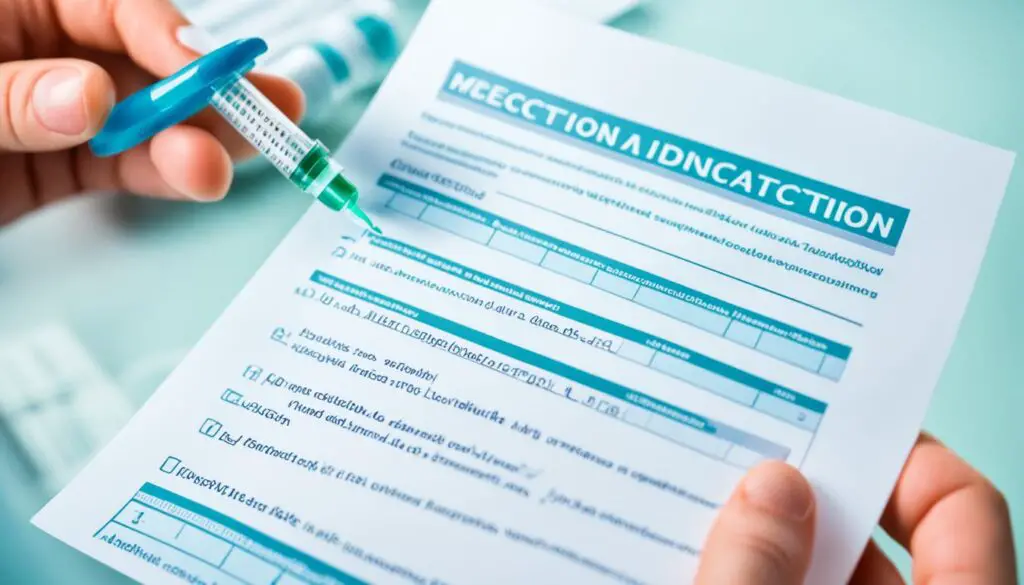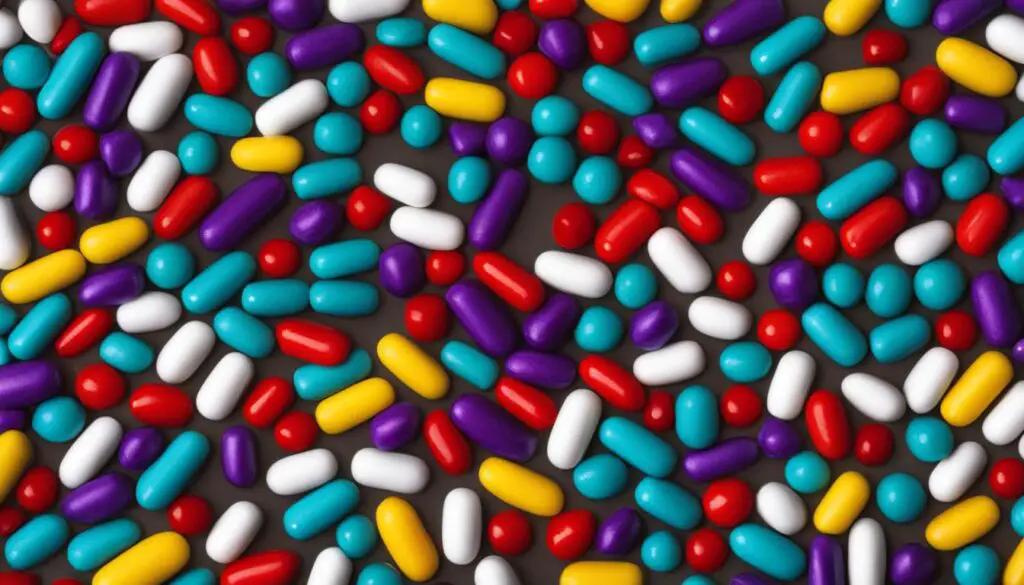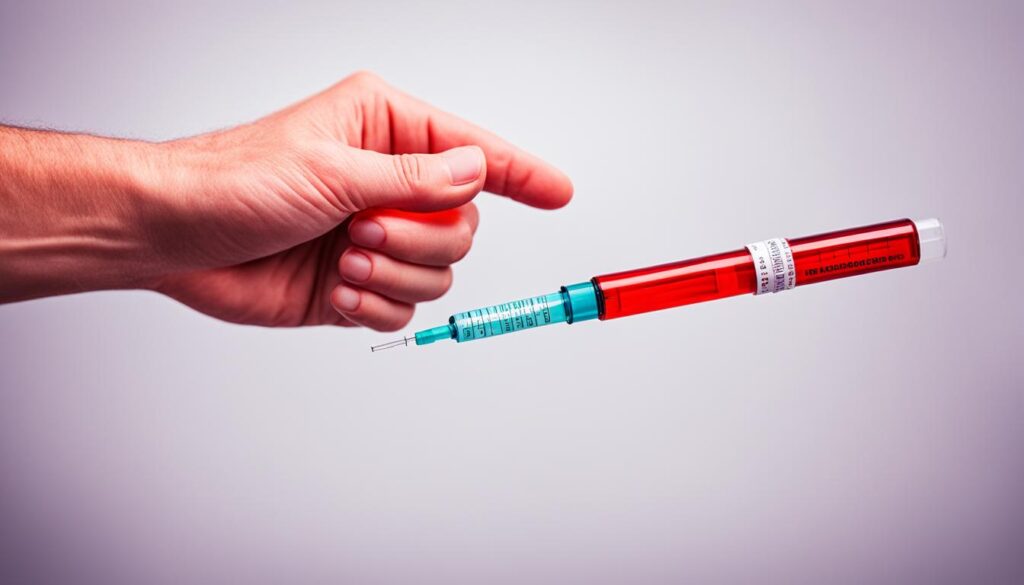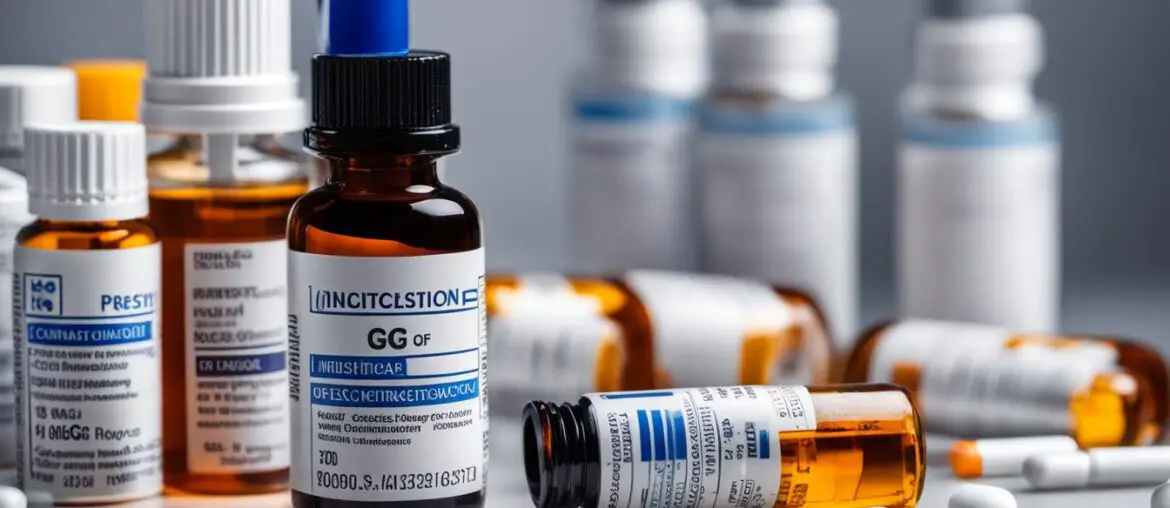Did you know that HCG injections can interact with certain medications, potentially leading to adverse effects or reduced effectiveness of either the HCG therapy or the other medication? It’s crucial to understand these interactions to ensure safe and effective HCG therapy.
According to available data from various sources, there is one medication known to interact with HCG injections, ganirelix, and two disease interactions: dependent neoplasm and volume overload. Consulting a healthcare provider before starting or stopping any medication is essential to avoid potential risks or complications.
Key Takeaways:
- HCG injections can interact with certain medications, potentially leading to adverse effects or reduced effectiveness of either the HCG therapy or the other medication.
- The medication ganirelix is known to interact with HCG injections, making it crucial to inform the healthcare provider about all medications being taken.
- HCG injections may also interact with certain diseases or medical conditions, such as dependent neoplasm and volume overload.
- Common side effects of HCG injections include headaches, restlessness, mild swelling, depression, and breast tenderness or swelling.
- The dosage of HCG injections may vary depending on the specific treatment needs, and it is important to follow the prescribed dosage and consult with a healthcare provider for proper administration and monitoring.
Medications that may interact with HCG Injections
The medication ganirelix is known to interact with HCG injections. Ganirelix is often used in reproductive medicine to prevent premature ovulation and is usually administered in combination with HCG therapy. It is essential to inform the healthcare provider about all medications being taken to ensure there are no harmful interactions. This includes prescription drugs, over-the-counter medications, and herbal supplements. Proper communication with the healthcare provider will help prevent potential drug interactions and ensure the safety and efficacy of HCG therapy.
When undergoing HCG therapy, it is crucial to be aware of potential medication reactions to maximize treatment benefits. The interaction between HCG injections and certain medications can lead to adverse effects or reduced effectiveness of both therapies. To safeguard your health, it is vital to consult with a healthcare provider before starting or stopping any medication while undergoing HCG treatment.
| Medication | Indication | Potential Interaction with HCG Injections |
|---|---|---|
| Ganirelix | Prevention of premature ovulation in reproductive medicine | Interacts with HCG injections and may affect treatment outcomes |
Proper communication with your healthcare provider is essential to ensure the safe and effective use of HCG injections. During your consultation, be sure to disclose all medications you are currently taking, including prescription drugs, over-the-counter medications, and herbal supplements. This comprehensive information will enable your healthcare provider to assess potential drug interactions and make informed treatment recommendations.
Remember, the goal of HCG therapy is to optimize your health and well-being. By actively participating in the treatment process and maintaining open communication with your healthcare provider, you can help ensure the success of your HCG therapy.
Disease Interactions with HCG Injections

HCG injections have the potential to interact with certain diseases or medical conditions. It is important to be aware of these interactions to ensure safe and effective HCG therapy.
Disease Interactions:
- Dependent neoplasm
- Volume overload
Individuals with pre-existing medical conditions or diseases should discuss their situation with a healthcare provider before starting HCG therapy. The healthcare provider can evaluate the potential risks and benefits of HCG injections in these specific cases and make well-informed treatment decisions.
It is crucial to prioritize open communication with a healthcare provider and provide comprehensive information about any existing medical conditions or diseases. This will ensure that the healthcare provider can assess the suitability of HCG therapy and mitigate any potential risks or complications.
Dependent Neoplasm
Dependent neoplasm refers to the presence of cancer that relies on a specific hormone for growth and survival. HCG injections may potentially interact with such neoplasms, and it is essential for healthcare providers to consider this when prescribing HCG therapy.
Patients with dependent neoplasms should coordinate closely with their healthcare provider to evaluate the risks and benefits associated with HCG injections. The healthcare provider can provide guidance on the appropriate course of action based on the individual’s medical history and the nature of the neoplasm.
Volume Overload
Volume overload refers to a condition where the body retains excessive fluid, potentially leading to complications such as swelling, shortness of breath, and increased strain on the heart. HCG injections may interact with volume overload, and healthcare providers need to assess its potential impact on individuals with this condition.
Patients with volume overload should consult their healthcare provider to determine the suitability of HCG therapy. The healthcare provider can evaluate the risks and benefits on an individual basis, considering the specific circumstances and medical history of the patient.
By discussing these disease interactions with healthcare providers, individuals can ensure that their HCG therapy aligns with their unique medical needs and minimizes the risk of adverse effects or complications.
| Disease Interaction | Description |
|---|---|
| Dependent neoplasm | The presence of cancer that relies on a specific hormone for growth and survival |
| Volume overload | An excessive fluid retention condition that can lead to swelling and increased strain on the heart |
Side Effects of HCG Injections
HCG injections may cause side effects, independent of potential medication interactions. It is important to be aware of these side effects to ensure the safety and well-being of individuals undergoing HCG therapy.
Common Side Effects
HCG injections may lead to the following common side effects:
- Headaches: Some individuals may experience headaches as a result of HCG injections.
- Restlessness: Feelings of restlessness or agitation may occur after receiving HCG injections.
- Mild swelling or water weight gain: HCG therapy can sometimes cause mild swelling or temporary water weight gain.
- Depression: In some cases, individuals may experience episodes of depression while undergoing HCG injections.
- Breast tenderness or swelling: HCG injections may cause breast tenderness or swelling in some individuals.
Serious Side Effects
Serious side effects associated with HCG injections are rare but should be addressed immediately when observed. These include:
- Hives: The development of hives, accompanied by itching and skin rashes, requires immediate medical attention.
- Difficulty breathing: Breathing difficulties, such as shortness of breath or wheezing, should be reported to a healthcare provider without delay.
- Chest pain: Persistent or severe chest pain should not be ignored and warrants immediate medical evaluation.
- Severe headache: Intense or persistent headaches that do not subside with over-the-counter pain medication should be urgently addressed by a healthcare professional.
- Severe eye or heart symptoms: Any sudden or severe eye or heart symptoms, such as vision changes or rapid heartbeat, should be promptly reported and evaluated by a medical professional.
It is important to stay vigilant for any unusual or severe side effects and report them to a healthcare provider. Prompt attention to side effects ensures appropriate management, minimizing potential risks associated with HCG injections.
Dosages of HCG Injections
In HCG therapy, the dosage of HCG injections may vary depending on the specific treatment needs. The dosage is determined based on various factors, including the purpose of treatment and individual response. Let’s take a closer look at the typical dosages used for assisted reproductive technologies and ovulation induction in females:
- HCG Injections for Assisted Reproductive Technologies: For individuals undergoing assisted reproductive technologies, such as in vitro fertilization (IVF), a common dosage is 250 mcg of HCG. This dosage is typically administered one day following the last dose of the follicle-stimulating agent.
- HCG Injections for Ovulation Induction: When used for ovulation induction in females, the dosage of HCG injections may also be 250 mcg. The timing and frequency of administration will depend on the specific treatment protocol recommended by the healthcare provider.
It is important to note that these dosages are provided as a general guideline and may be adjusted by the healthcare provider based on individual factors and treatment response. Always follow the prescribed dosage and consult with a healthcare provider for proper administration and monitoring.
Remember that any medication, including HCG injections, has the potential for medication contraindications and medication reactions. For personalized advice and recommendations regarding medication compatibility and potential drug interactions, it’s crucial to consult a healthcare provider.
Other Drugs Interactions with HCG Injections

Besides ganirelix, there are currently no known severe, serious, or moderate drug interactions with HCG injections. However, it is always important to disclose all medications being taken to the healthcare provider to ensure there are no potential interactions that may have been missed. This includes both prescription and over-the-counter medications. Any known or potential interactions can be further assessed by the healthcare provider to ensure safe and effective HCG therapy.
It is crucial to prioritize open and transparent communication with your healthcare provider regarding medication use to minimize the risk of drug interactions. By providing a comprehensive list of all the medications you are currently taking, your healthcare provider can evaluate potential interactions with HCG injections. This proactive approach ensures that any risks or potential complications can be identified and managed appropriately.
| Common Medications that May Interact with HCG Injections |
|---|
| Ganirelix |
| *No other known interactions at this time |
It is crucial to prioritize open and transparent communication with your healthcare provider regarding medication use to minimize the risk of drug interactions. By providing a comprehensive list of all the medications you are currently taking, your healthcare provider can evaluate potential interactions with HCG injections. This proactive approach ensures that any risks or potential complications can be identified and managed appropriately.
Warnings and Precautions for HCG Injections
HCG injections can provide numerous benefits for those undergoing therapy. However, it’s crucial to be aware of the medication contraindications for HCG injections and exercise caution when using this treatment. By understanding the potential risks and taking necessary precautions, individuals can optimize the safety and effectiveness of their HCG therapy.
Contraindications
There are certain situations in which HCG injections are contraindicated. These include the presence of dependent neoplasm and volume overload, which were mentioned earlier as disease interactions. It is vital to disclose any pre-existing medical conditions or diseases to your healthcare provider before initiating HCG therapy. This will allow them to evaluate the potential risks and benefits of HCG injections in your specific case and make informed treatment decisions.
Possible Adverse Effects
While HCG injections can be safe when used appropriately, there are potential adverse effects that individuals should be aware of and discuss with their healthcare provider. These include:
- Blood clotting: HCG injections have the potential to increase the risk of blood clotting. If you have a history of blood clotting disorders or are at an increased risk, it’s important to discuss this with your healthcare provider.
- Ovarian hyperstimulation syndrome (OHSS): HCG injections can lead to OHSS, a condition characterized by the enlargement of the ovaries and the accumulation of fluid in the abdomen. Symptoms can range from mild discomfort to severe pain and should be immediately reported to your healthcare provider.
- Early puberty in young boys: HCG injections should not be used in young boys who have not yet reached puberty. It can lead to the early development of secondary sexual characteristics and affect normal growth and development.
Pregnancy and Lactation
It is important to note that HCG injections should not be used during pregnancy or lactation. HCG injections can cause birth defects and may have adverse effects on both the mother and the developing fetus. If you are pregnant or breastfeeding, it is crucial to inform your healthcare provider to explore alternative treatment options.
Before initiating HCG therapy, it is essential to discuss these warnings and precautions with your healthcare provider. They can provide personalized guidance and recommendations, considering your specific circumstances, and help ensure the safe and effective use of HCG injections as part of your treatment plan.
Potential Side Effects of HCG Injections

HCG injections, like any medication, can have both common and rare side effects. It is essential to be aware of these potential side effects to ensure your safety and well-being during HCG therapy. While most side effects are mild and temporary, some may require immediate medical attention. Here are some possible side effects associated with HCG injections:
- Headache: Some individuals may experience headaches as a side effect of HCG injections. These headaches are usually mild and go away on their own.
- Restlessness: Restlessness or feeling agitated can occur as a response to HCG injections. This side effect is generally temporary and should subside over time.
- Tiredness: Feelings of fatigue or tiredness may be experienced by some individuals during HCG therapy. It is recommended to get sufficient rest and consult with your healthcare provider if fatigue persists.
- Pain at the injection site: It is common to experience some discomfort or pain at the injection site after administering HCG injections. Applying a cold compress and massaging the area gently can help alleviate this side effect.
- Mild swelling: Swelling or water retention is a possible side effect of HCG injections. This swelling is typically mild and resolves on its own without intervention.
Although serious side effects are rare, it is essential to be aware of them and seek immediate medical attention if they occur. These serious side effects may include:
- Severe pelvic pain
- Swelling of the hands or legs
- Stomach pain and swelling
- Shortness of breath
- Weight gain
- Decreased urination
- Chest pain
- Severe headache
- Confusion
- Sudden vision changes
- Pain or swelling in the legs
If you experience any of these severe side effects, contact your healthcare provider immediately for further evaluation and guidance.
| Common Side Effects | Rare but Serious Side Effects |
|---|---|
|
|
Overall Safety and Efficacy of HCG Injections
Despite the potential for medication interactions, HCG injections can be safe and effective when administered properly. Close communication with a knowledgeable healthcare provider is essential to ensure individual safety and efficacy. Adhering to prescribed dosages and reporting any adverse effects or concerns promptly will help optimize the benefits of HCG therapy.
“Proper administration and regular communication with a healthcare provider are key to ensuring the safety and effectiveness of HCG injections.”
HCG injections have shown promising results in various therapeutic uses, such as aiding in weight loss, fertility treatments, and testosterone replacement therapy. However, it is important to be aware of potential drug interactions to avoid any untoward effects.
The safety and efficacy of HCG injections can be further enhanced by taking the following precautions:
- Consultation with a healthcare provider: Prior to starting HCG therapy, it is crucial to consult with a healthcare provider who can evaluate individual medical history, current medications, and any underlying health conditions that may affect the compatibility of HCG injections.
- Adherence to prescribed dosages: Following the prescribed dosages ensures that the medication is administered in a safe and controlled manner. It is important not to exceed or skip doses without consulting with a healthcare provider.
- Monitoring for adverse effects: Individuals using HCG injections should be vigilant about monitoring for any adverse effects. This includes reporting any unusual symptoms, allergic reactions, or changes in overall health to the healthcare provider.
- Regular follow-up visits: Regular follow-up visits with the healthcare provider are crucial to assess the progress of HCG therapy and address any concerns or questions that may arise.
Potential Medication Reactions with HCG Injections
| Medication | Potential Reaction |
|---|---|
| Ganirelix | Interacts with HCG injections, often used in combination in reproductive medicine to prevent premature ovulation. |
It is important to remember that while this table illustrates a known medication reaction, it is essential to disclose all medications and supplements being taken to the healthcare provider to ensure there are no potential interactions that may have been missed.
HCG therapy can be a valuable treatment option when managed effectively and in collaboration with a healthcare provider. By following the recommended guidelines, individuals can enhance the safety and efficacy of HCG injections, optimizing the benefits of therapy.
Conclusion
In conclusion, it is important to be aware of the potential interactions between HCG injections and other medications. By understanding the possible side effects, following proper dosages, and taking precautionary measures, you can ensure safe and effective HCG therapy. It is crucial to maintain open communication with your healthcare provider and promptly report any concerns or adverse effects that arise during treatment. Consulting a healthcare provider for personalized guidance and recommendations regarding medication compatibility and potential drug interactions is essential when undergoing HCG therapy.
Remember, HCG injections can interact with certain medications, and it is important to prioritize your safety and optimal treatment outcomes. By maintaining a collaborative relationship with your healthcare provider, you can navigate concurrent medication use and potential drug interactions more effectively. Together, you can ensure that your HCG therapy is tailored to your specific needs and provides the best possible results.
When it comes to your health, it is always better to be well-informed. With the right knowledge and guidance, you can confidently embark on your HCG therapy journey, knowing that you have taken appropriate steps to mitigate potential risks and maximize the benefits of this treatment. Take the time to discuss any concerns or questions with your healthcare provider to create a personalized plan that is safe, effective, and compatible with your concurrent medication use.
FAQ
Are there any medications that can interact with HCG injections?
Yes, there is one medication known to interact with HCG injections called ganirelix. It is important to inform your healthcare provider about all medications you are taking to avoid potential interactions.
What are the disease interactions associated with HCG injections?
The disease interactions associated with HCG injections are dependent neoplasm and volume overload. It is crucial to discuss any pre-existing medical conditions or diseases with your healthcare provider before starting HCG therapy.
What are the common side effects of HCG injections?
Common side effects of HCG injections include headaches, restlessness, mild swelling or water weight gain, depression, and breast tenderness or swelling.
What are the recommended dosages of HCG injections?
The dosage of HCG injections may vary, but for assisted reproductive technologies and ovulation induction in females, a typical dosage is 250 mcg given 1 day following the last dose of the follicle-stimulating agent. It is important to follow the prescribed dosage and consult with your healthcare provider for proper administration and monitoring.
Are there any other medications that may interact with HCG injections?
Besides ganirelix, there are currently no known severe, serious, or moderate drug interactions with HCG injections. However, it is still important to disclose all medications you are taking to your healthcare provider to ensure there are no potential interactions that may have been missed.
What are the warnings and precautions for HCG injections?
HCG injections are contraindicated in the presence of dependent neoplasm and volume overload. Additionally, caution should be exercised when using HCG injections, as possible adverse effects include blood clotting, ovarian hyperstimulation syndrome (OHSS), and early puberty in young boys. Pregnancy and lactation are important considerations, as HCG injections can cause birth defects and should not be used during pregnancy.
What are the potential side effects of HCG injections?
Potential side effects of HCG injections may include headache, restlessness, tiredness, pain at the injection site, and mild swelling. Serious side effects are rare but can include severe pelvic pain, swelling of the hands or legs, stomach pain and swelling, shortness of breath, weight gain, and decreased urination.
Are HCG injections safe and effective?
With proper administration and communication with a healthcare provider, HCG injections can be safe and effective. It is crucial to follow prescribed dosages, report any adverse effects, and consult with your healthcare provider for personalized guidance and recommendations.
What should I do if I experience any side effects from HCG injections?
If you experience any unusual or severe side effects from HCG injections, it is important to report them promptly to your healthcare provider for evaluation and guidance.
How can I ensure the safety and efficacy of HCG therapy?
To ensure the safety and efficacy of HCG therapy, it is important to maintain open communication with your healthcare provider, follow prescribed dosages, and report any concerns or adverse effects promptly.




